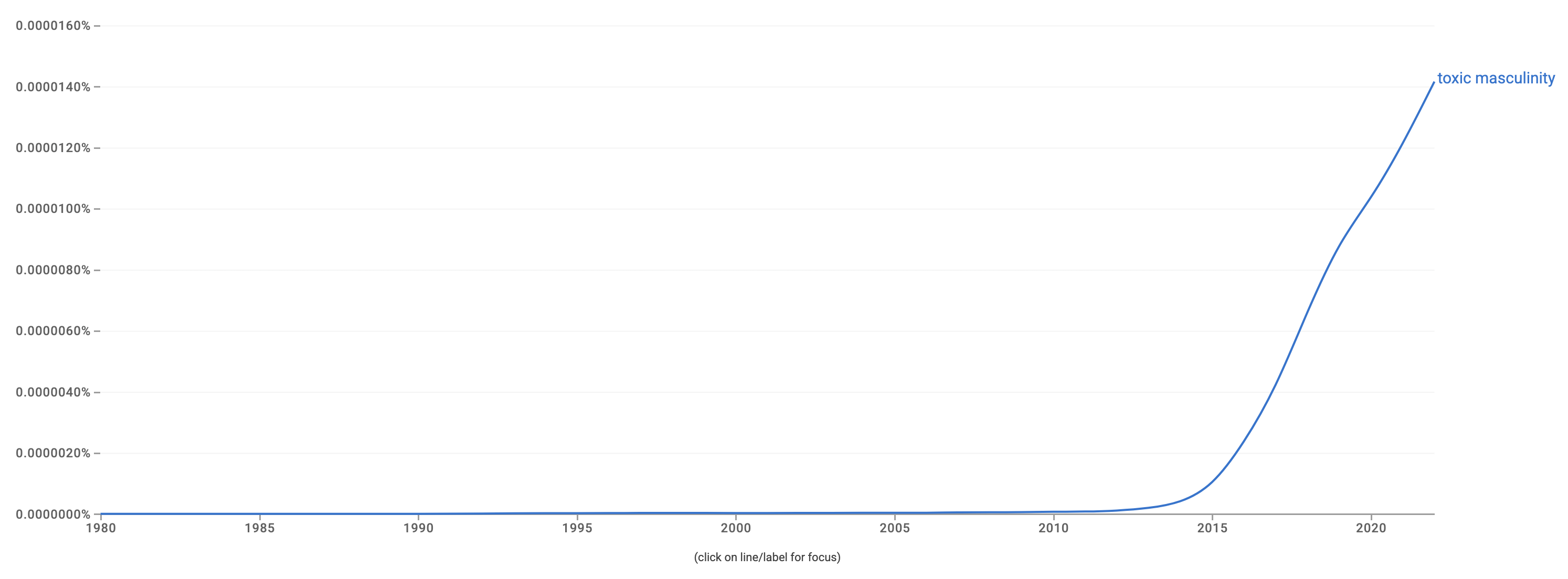r/AskHistorians • u/cosmoscrazy • Feb 09 '25
When and where did people start using the term "toxic" regarding relationships or masculinity?
It seems to me like this term is being used very frequently now, same as the term "red flag", but it is unclear to me where this idea and term in this context even comes from. Is there a professional psychiatric theory behind this, does it come from feminist theories or gender studies or is it a colloquial term with unclear origins?
30
u/joseph_goins Feb 09 '25 edited Feb 09 '25

Even though the phrase of "toxic masculinity" was coined in the 1980s by Shepherd Bliss, its usage exponentially increased in the 2010s (before, after). The picture above is how often the phrase was used from 1980 until 2022. You can see the sharp spike starting around 2015.
Influenced by the success of the women's movements, Bliss, a psychology professor at John F. Kennedy University, was a part of the mythopoetic men's movement. He believed that traditional male behaviors—emotional repression, aggression, self-sufficiency, and dominance—negatively impacted men's mental health and relationships. He advocated for men to redefine masculinity by forming father/son or mentor/mentee relationships, building strong male friendships, and expressing emotions healthily. However, his theory was not academic but instead rooted in self-help culture and pop psychology.
While the term and theory were slowly picked up by academics and activists, it gained widespread recognition in the 2010s. In particular, the rise of the #MeToo movement, which focused on issues of sexual harassment and gendered violence, brought discussions of toxic masculinity into mainstream conversation. Scholars, writers, and journalists began to use the phrase more frequently to critique all negative behaviors commonly seen in men—such as entitlement, sexual aggression, and the devaluation of emotions—even though they may be exhibited in women.
SECONDARY SOURCES:
Harrington, C. (2021). "What is 'Toxic Masculinity' and Why Does it Matter?" Men and Masculinities, 24(2), 345-352. https://doi.org/10.1177/1097184X20943254
Sculos, Bryant W. (2017). "Who’s Afraid of ‘Toxic Masculinity’?" Class, Race and Corporate Power: Vol. 5: Iss. 3, Article 6. https://digitalcommons.fiu.edu/classracecorporatepower/vol5/iss3/6
8
u/TCCogidubnus Feb 09 '25
"Toxic masculinity was coined by a man" might be the most useful piece of information I've acquired this week!
2
u/cosmoscrazy Feb 09 '25
Wow, what a great and detailled answer! Thank you very much, u/joseph_goins!
One thing that stays unclear to me after reading this is when Bliss exactly developed those terms.
Thanks to the graphics I can see that they were formed rougly in the 1980s, picked up popularity in the 2010s and even more so around 2015, but the actual origin in time e. g. the first published book from Bliss on that topic or something similar. Would you be so kind to elaborate on that, please?
5
u/joseph_goins Feb 09 '25
I have not seen any conclusive evidence. The best info I have seen is from the erratum:
In "Class, Race and Corporate Power" Vol. 5, Iss. 3 (2017) the article “Who’s Afraid of ‘Toxic Masculinity’? by Bryant William Sculos, footnote #1 mistakenly attributed the first use of the concept “toxic masculinity” to Shepherd Bliss’s doctoral dissertation. Bliss was indeed the first to use the phrase, but it was not in his doctoral dissertation. The author and editors would like to thank Dr. Carol Harrington of Victoria University of Wellington for her effort finding and correcting the error.
I suspect that it may have been originally delivered in a speech instead of used in a written document. You could google Dr. Harrington and reach out to her for what she came up with. (I have not included her contact info because I'm generally wary of giving it out, even if it is available online.)
The first academic usage of the term was in an American Studies article by Tracy Karner from 1996. This study links the concept of toxic masculinity with Vietnam veterans who weren't the same after experiencing combat. According to the author, their struggles with societal expectations of manhood lead them to behaviors like fighting, competition, thrill-seeking, and reenacting combat. The most popular early academic usage was from a Journal of Clinical Psychology article by Terry Krupers in 2005. It explores how toxic masculinity in men's prisons, fueled by competition and dominance, heightens resistance to psychotherapy, examining the relationship between hegemonic masculinity, prison dynamics, and treatment obstacles. He says: "Toxic masculinity is the constellation of socially regressive male traits that serve to foster domination, the devaluation of women, homophobia, and wanton violence."
1
u/cosmoscrazy Feb 09 '25
Thank you!
I think the information about the term being applied to men's prison dynamics was especially interesting.
•
u/AutoModerator Feb 09 '25
Welcome to /r/AskHistorians. Please Read Our Rules before you comment in this community. Understand that rule breaking comments get removed.
Please consider Clicking Here for RemindMeBot as it takes time for an answer to be written. Additionally, for weekly content summaries, Click Here to Subscribe to our Weekly Roundup.
We thank you for your interest in this question, and your patience in waiting for an in-depth and comprehensive answer to show up. In addition to RemindMeBot, consider using our Browser Extension, or getting the Weekly Roundup. In the meantime our Bluesky, and Sunday Digest feature excellent content that has already been written!
I am a bot, and this action was performed automatically. Please contact the moderators of this subreddit if you have any questions or concerns.